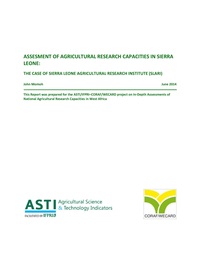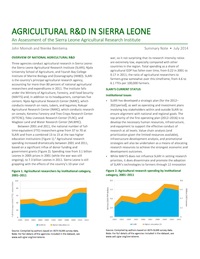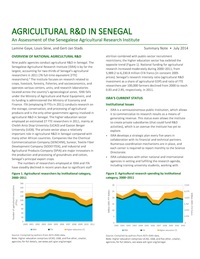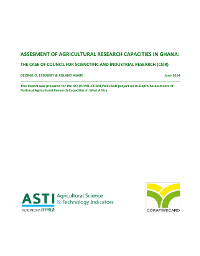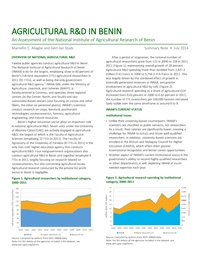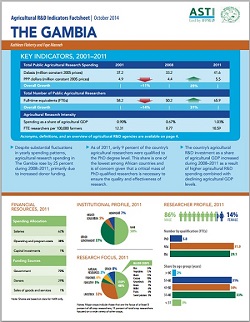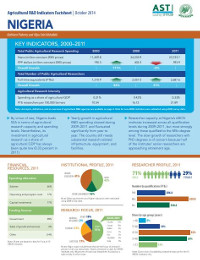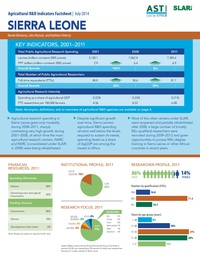Évaluation des problè mes critiques de la recherche et developpement agricole au Bénin : le cas de l’Institut National des Recherches Agricoles du Bénin (INRAB)
En 2013 et en 2014, le programme ASTI, le CORAF et des points focaux nationaux ont réalisé une évaluation approfondie des enjeux critiques relatifs aux capacités humaines, financières et institutionnelles auxquels doivent faire face l'INRAB.
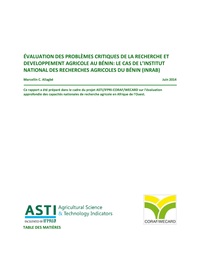
Authors:
John Momoh
Year:
2014
Publisher
International Food Policy Research Institute and West and Central African Council for Agricultural Research and Development (CORAF/WECAR)
Back to:
During 2013–2014, ASTI, CORAF/WECARD, and national focal points carried out an in-depth assessment of the critical human, financial, and institutional capacity issues that SLARI is facing. The assessment included a quantitative survey collecting information on human and financial resources, R&D infrastructure, and R&D outputs; a series of face-to-face interviews with selected research and managerial staff; and a staff motivation survey distributed to a selected group of researchers and managerial staff.
Authors:
John Momoh and Nienke Beintema
Year:
2014
Publisher
International Food Policy Research Institute and West and Central African Council for Agricultural Research and Development (CORAF/WECAR)
Back to:
During 2013–2014, ASTI, CORAF/WECARD, and national focal points carried out an in-depth assessment of the critical human, financial, and institutional capacity issues that SLARI is facing. The assessment included a quantitative survey collecting information on human and financial resources, R&D infrastructure, and R&D outputs; a series of face-to-face interviews with selected research and managerial staff; and a staff motivation survey distributed to a selected group of researchers and managerial staff.
Authors:
Lamine Gaye , Louis Sène , and Gert - Jan Stads
Year:
2014
Publisher
International Food Policy Research Institute and West and Central African Council for Agricultural Research and Development (CORAF/WECAR)
Back to:
During 2013–2014, ASTI, CORAF/WECARD, and national focal points carried out an in-depth assessment of the critical human, financial, and institutional capacity issues that ISRA is facing. The assessment included a quantitative survey collecting information on human and financial resources, R&D infrastructure, and R&D outputs; a series of face-to-face interviews with selected research and managerial staff; and a staff motivation survey distributed to a selected group of researchers and managerial staff.
Authors:
George O. Essegbey & Roland Asare
Year:
2014
Publisher
International Food Policy Research Institute and West and Central African Council for Agricultural Research and Development (CORAF/WECAR)
Back to:
During 2013–2014, ASTI, CORAF/WECARD, and national focal points carried out an in-depth assessment of the critical human, financial, and institutional capacity issues that CSIR is facing. The assessment included a quantitative survey collecting information on human and financial resources, R&D infrastructure, and R&D outputs; a series of face-to-face interviews with selected research and managerial staff; and a staff motivation survey distributed to a selected group of researchers and managerial staff.
Authors:
Marcellin C. Allagbe and Gert - Jan Stads
Year:
2014
Publisher
International Food Policy Research Institute and West and Central African Council for Agricultural Research and Development (CORAF/WECAR)
Back to:
During 2013–2014, ASTI, CORAF/WECARD, and national focal points carried out an in-depth assessment of the critical human, financial, and institutional capacity issues that INRAB is facing. The assessment included a quantitative survey collecting information on human and financial resources, R&D infrastructure, and R&D outputs; a series of face-to-face interviews with selected research and managerial staff; and a staff motivation survey distributed to a selected group of researchers and managerial staff.
Gabon: ASTI–IRAF Fiche d’information 2014
On note depuis 2000 une chute drastique des dépenses de R&D agricole gabonaises : en tant que pourcentage du PIB agricole (0,09 % en 2011), elles figurent parmi les plus faibles de l’Afrique.
À la différence de nombreux pays d’Afrique centrale et occidentale, le statut de « pays à revenu intermédiaire, tranche supérieure » préjuge le Gabon de l’éligibilité à l’aide publique au développement ce qui aggrave encore les difficultés financières des organismes de recherche agricole.
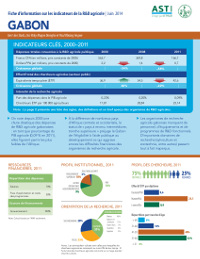
Authors:
Kathleen Flaherty and Faye Manneh
Year:
2014
Publisher
International Food Policy Research Institute and National Agricultural Research Institute.
Back to:
Despite substantial fluctuations in yearly spending patterns, agricultural research spending in The Gambia rose by 25 percent during 2008–2011, primarily due to increased donor funding.
As of 2011, only 9 percent of the country’s agricultural researchers were qualified to the PhD degree level. This share is one of the lowest among African countries and is of concern given that a critical mass of PhD-qualified researchers is necessary to ensure the quality and effectiveness of research.
Authors:
Kathleen Flaherty and Aliyu Sabi Abdullahi
Year:
2014
Publisher
International Food Policy Research Institute and Agricultural Research Council of Nigeria.
Back to:
By virtue of size, Nigeria leads SSA in terms of agricultural research capacity and spending levels. Nevertheless, its investment in agricultural research as a share of agricultural GDP has always been quite low (0.33 percent in 2011).
Yearly growth in agricultural R&D spending slowed during 2009–2011 and fluctuated significantly from year to year. The country still needs substantial research-related infrastructure, equipment, and facilities.
Authors:
Nienke Beintema, John Momoh, and Kathleen Flaherty
Year:
2014
Publisher
International Food Policy Research Institute and Sierra Leone Agricultural Research Institute.
Back to:
Agricultural research spending in Sierra Leone grew only modestly during 2008–2011, sharply contrasting very high growth during 2001–2008, at which time the main agricultural research centers, NARC and RARC (consolidated under SLARI in 2008) were being rehabilitated.
Despite significant growth over time, Sierra Leone’s agricultural R&D spending remains well below the levels required to sustain its needs; spending levels as a share of AgGDP are among the lowest in Africa.

